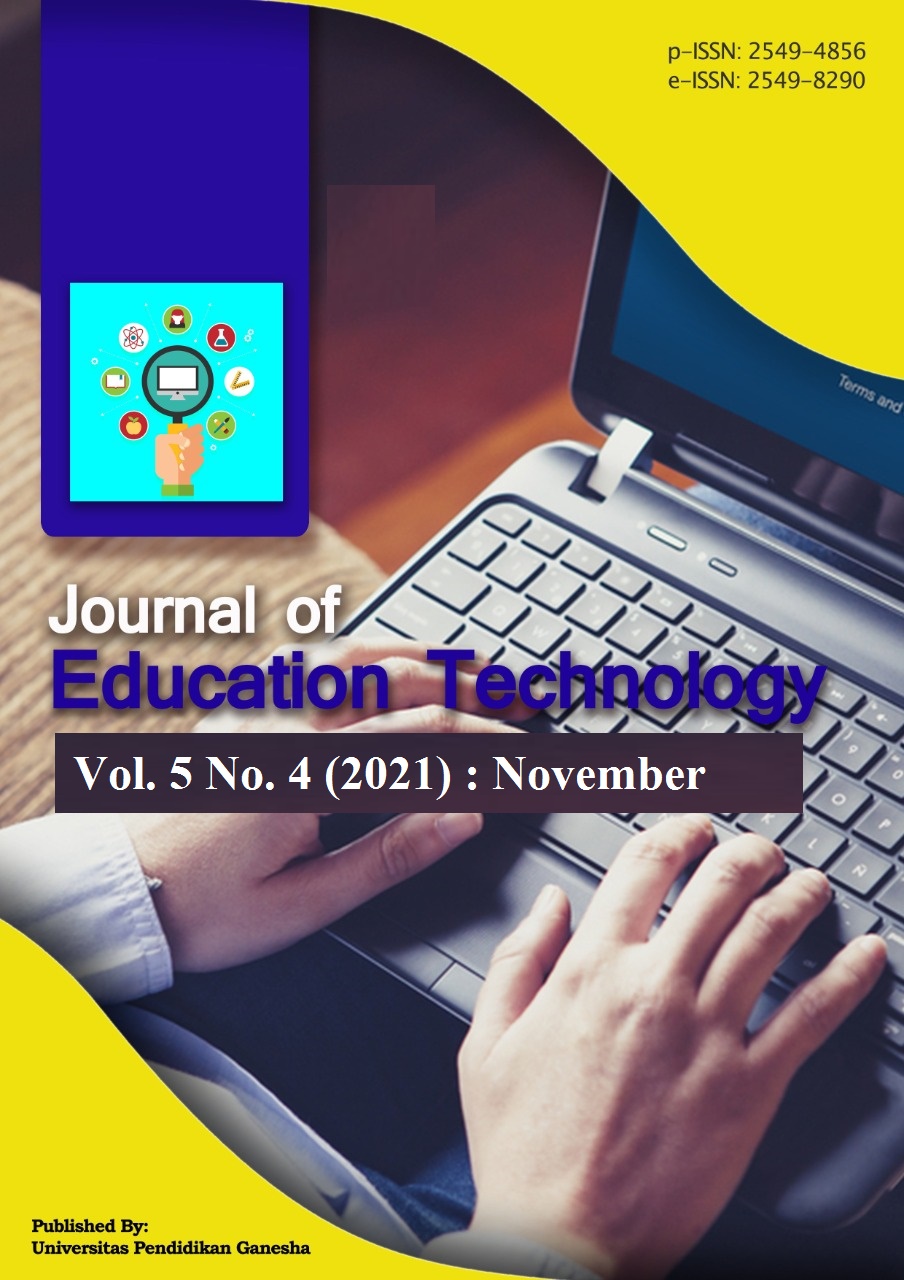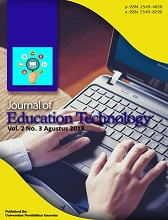The Impact of Computer-based Test and Students’ Ability in Computer Self - Efficacy on Mathematics Learning Outcomes
DOI:
https://doi.org/10.23887/jet.v5i4.34942Keywords:
CBT, CSE, Learning OutcomesAbstract
The current era of digitalization has big impact on education, the use of technology and information is not only for learning but as an evaluation tool. This development raises problems that require the completion of high-level thinking, therefore students need to prepare the ability to think and be able to develop skills. This study aims to measure the self-efficacy of computer skills on student learning outcomes and interactions in mathematics subjects. This research method used quantitative approach in Quasi Experiment Design. Total sample were 64 students. CBT was used in evaluating mathematics subjects and using a questionnaire to determine the level of self-efficacy of computer abilities towards students learning outcomes. Analysis of research data was carried out using ANOVA, to test the hypothesis using two-way ANOVA (two-way ANOVA) using the SPSS version 25.0 for windows software program. The results showed that there was CBT of mathematics subjects towards student learning outcomes with a mean score of 85 in and a mean score of 80 with a criterion of 3.03, having impact and the criteria value 2.78. The interaction between computer-based tests with self-efficacy computer capabilities had the most correlation with a positive relationship. It can be stated that there is an impact of computer-based tests and self-efficacy of computer ability and has an interaction between CBT and self-efficacy on learning outcomes.
References
Abosalem, Y. (2016). Assessment techniques and students’ higher-order thinking skills. International Journal of Secondary Education, 4(1), 1–11. https://doi.org/10.11648/j.ijsedu.20160401.11.
Achim, N., & Kassim, A. Al. (2015). Computer Usage: The Impact of Computer Anxiety and Computer Self-efficacy. Procedia - Social and Behavioral Sciences, 172, 701–708. https://doi.org/10.1016/j.sbspro.2015.01.422.
Azizah, U., Djono, D., & Musadad, A. A. (2020). Developing Digital Book Based on Lafran Pane’ Thought for Increasing State Defend Attitude of Students. Yupa: Historical Studies Journal, 4(1), 29–39. https://doi.org/10.30872/yupa.v4i1.235.
Balogun, A. G., & Olanrewaju, A. S. (2016). Role of Computer Self-Efficacy and Gender in Computer-Based Test Anxiety Among Undergraduates in Nigeria. Psychological Thought, 9(1). https://doi.org/10.5964/psyct.v9i1.160.
Barnes, S. J., Pressey, A. D., & Scornavacca, E. (2019). Mobile ubiquity: Understanding the relationship between cognitive absorption, smartphone addiction and social network services. In Computers in Human Behavior (Vol. 90). Elsevier B.V. https://doi.org/10.1016/j.chb.2018.09.013.
Bressington, D. T., Wong, W. kit, Lam, K. K. C., & Chien, W. T. (2018). Concept mapping to promote meaningful learning, help relate theory to practice and improve learning self-efficacy in Asian mental health nursing students: A mixed-methods pilot study. Nurse Education Today, 60(February 2017), 47–55. https://doi.org/10.1016/j.nedt.2017.09.019.
Chua, Y. P., & Don, Z. M. (2013). Effects of computer-based educational achievement test on test performance and test takers’ motivation. Computers in Human Behavior, 29(5). https://doi.org/10.1016/j.chb.2013.03.008.
Daniels, L. M., & Gierl, M. J. (2017). The impact of immediate test score reporting on university students’ achievement emotions in the context of computer-based multiple-choice exams. Learning and Instruction, 5(2). https://doi.org/10.1016/j.learninstruc.2017.04.001.
Dashtestani, R. (2013). Implementing mobile-assisted language learning (MALL) in an EFL context: Iranian EFL teachers’ perspectives on challenges and affordances. The JALT CALL Journal, 9(2), 149–168. https://doi.org/10.29140/jaltcall.v9n2.153.
Dong, Y., Xu, C., Chai, C. S., & Zhai, X. (2020). Exploring the Structural Relationship Among Teachers’ Technostress, Technological Pedagogical Content Knowledge (TPACK), Computer Self-efficacy and School Support. Asia-Pacific Education Researcher, 29(2), 147–157. https://doi.org/10.1007/s40299-019-00461-5.
Fonda, A., & Sumargiyani, S. (2018). The Developing Math Electronic Module With Scientific Approach Using Kvisoft Flipbook Maker Pro For Xi Grade Of Senior High School Students. Infinity Journal, 7(2), 109–122. https://doi.org/10.22460/infinity.v7i2.p109-122.
Gazali, M. (2017). Pengaruh Efikasi Diri dan Kecemasan Matematika terhadap Kemampuan Berpikir Kritis. Jurnal Penelitian Pendidikan Dan Penilaian Pendidikan, 2(2), 274–289. https://doi.org/10.22236/JPPP.
Hatlevik, O. E., Throndsen, I., Loi, M., & Gudmundsdottir, G. B. (2018a). Students’ ICT self-efficacy and computer and information literacy: Determinants and relationships. Computers and Education, 118, 107–119. https://doi.org/10.1016/j.compedu.2017.11.011.
Hatlevik, O. E., Throndsen, I., Loi, M., & Gudmundsdottir, G. B. (2018b). Students’ ICT self-efficacy and computer and information literacy: Determinants and relationships. Computers and Education, 118(November 2017), 107–119. https://doi.org/10.1016/j.compedu.2017.11.011.
Hung, C.-M., Huang, I., & Hwang, G.-J. (2014). Effects of digital game-based learning on students’ self-efficacy, motivation, anxiety, and achievements in learning mathematics. Journal of Computers in Education, 1(2–3), 151–166. https://doi.org/10.1007/s40692-014-0008-8.
Hussein, E., Daoud, S., Alrabaiah, H., & Badawi, R. (2020). Exploring undergraduate students’ attitudes towards emergency online learning during COVID-19: A case from the UAE. Children and Youth Services Review, 119(10), 105699. https://doi.org/10.1016/j.childyouth.2020.105699.
Hwang, I. H., Chang, C. C., Wang, H. L., Tsai, S. J., & Chen, T. Y. (2011). Mediating effects of computer self-efficacy between learning motivation and learning achievement. Advances in Intelligent and Soft Computing, 109, 67–73. https://doi.org/10.1007/978-3-642-24772-9_10.
Imam, I., Ayubi, A., & Bernard, M. (2018). Pengaruh Pembelajaran Berbasis Masalah Terhadap Kemampuan Pemecahan Masalah Matematis Siswa SMA. JPMI:Jurnal Pembelajaran Matematika Inovatif, 1(3), 355–360. https://doi.org/10.22460/jpmi.v1i3.355-360.
Incedayı, N. (2018). The Impact of Using Multimedia Technologies on Students Academic Achievement in the Bakirköy Final College. International Journal of Humanities, Social Sciences and Education, 5(1), 40–47. https://doi.org/10.20431/2349-0381.0501007.
Kartika, Y., Wahyuni, R., Sinaga, B., & Rajagukguk, J. (2019). Improving Math Creative Thinking Ability by using Math Adventure Educational Game as an Interactive Media. Journal of Physics: Conference Series, 1179(1), 1–6. https://doi.org/10.1088/1742-6596/1179/1/012078.
Liao, S., Hong, J.-C., Wen, M.-H., Pan, Y.-C., & Wu, Y.-. (2018). Applying Technology Acceptance Model (TAM) to explore Users’ Behavioral Intention to Adopt a Performance Assessment System for E-book Production. EURASIA Journal of Mathematics, Science and Technology Education, 14(10). https://doi.org/10.29333/ejmste/93575.
Malik, R. S. (2018). Educational Challenges in 21st Century and Sutainable Development. Journal of Sustainable Development Education and Research, 2(1), 9–20. https://doi.org/10.17509/jsder.v2i1.12266.
Mpungose, C. B. (2021). Lecturers’ reflections on use of Zoom video conferencing technology for e-learning at a South African university in the context of coronavirus. African Identities. https://doi.org/10.1080/14725843.2021.1902268.
Nurdin, E., Ma’aruf, A., Amir, Z., Risnawati, R., Noviarni, N., & Azmi, M. P. (2019). Pemanfaatan video pembelajaran berbasis Geogebra untuk meningkatkan kemampuan pemahaman konsep matematis siswa SMK. Jurnal Riset Pendidikan Matematika, 6(1), 87–98. https://doi.org/10.21831/jrpm.v6i1.18421.
Odaci, H. (2013). The Role of Computer Self-efficacy, Self-esteem, and Subjective Well-being in Predicting Research Self-efficacy Among Postgraduate Students. Asia-Pacific Education Researcher, 22(4), 399–406. https://doi.org/10.1007/s40299-012-0039-8.
Pellas, N. (2014). The influence of computer self-efficacy, metacognitive self-regulation and self-esteem on student engagement in online learning programs: Evidence from the virtual world of Second Life. Computers in Human Behavior, 35, 157–170. https://doi.org/10.1016/j.chb.2014.02.048.
R. Burke Johnson, L. C. (2014). Educational Research Quantitative, Qualitative, and Mixed Approaches. In SAGE Publications India Pvt. Ltd (5th ed., Vol. 4, Issue 1). Library of Congress Cataloging-in-Publication Data. https://doi.org/10.4324/9781351004626-12.
Rachmawati, T. K. (2018). Pengaruh Metode Ekspositori Pada Pembelajaran Matematika Dasar Mahasiswa Manajemen Pendidikan Islam. Jurnal Pendidikan Edutama, 5(1). https://doi.org/10.30734/jpe.v5i1.130.
Rosidah, Ketut Budayasa, I., & Juniati, D. (2018). An Analysis of Statistical Reasoning Process of High School Students in Solving the Statistical Problem. Journal of Physics: Conference Series, 1028(1). https://doi.org/10.1088/1742-6596/1028/1/012125.
Safi’i, A., & Bharata, H. (2021). Hubungan Kemampuan Pemecahan Masalah dan Pemahaman Konsep Matematis terhadap Kemampuan Computer Self-Efficacy. JKPM (Jurnal Kajian Pendidikan Matematika), 6(2), 215. https://doi.org/10.30998/jkpm.v6i2.9826.
Sagala, P. N., & Andriani, A. (2019). Development of Higher-Order Thinking Skills (HOTS) Questions of Probability Theory Subject Based on Bloom’s Taxonomy. Journal of Physics: Conference Series, 1188(1). https://doi.org/10.1088/1742-6596/1188/1/012025.
Santosa, F. H., Negara, H. R. P., & Samsul Bahri. (2020). Efektivitas Pembelajaran Google Classroom Terhadap Kemampuan Penalaran Matematis Siswa. Jurnal Pemikiran Dan Penelitian Pendidikan Matematika (JP3M), 3(1), 62–70. https://doi.org/10.36765/jp3m.v3i1.254.
Sun, J. C. Y., & Rueda, R. (2012). Situational interest, computer self-efficacy and self-regulation: Their impact on student engagement in distance education. British Journal of Educational Technology, 43(2), 191–204. https://doi.org/10.1111/j.1467-8535.2010.01157.x.
Taruh, E., Abbas, N., & Umar, M. K. (2019). Studies The Influence Of Blended Learning-Based Guided Inquiry Learning Model And Self Efficacy On Students ’ Scientific Literacy. European Journal Of Education, 1, 137–150. https://doi.org/10.5281/zenodo.3445474.
Taştan, S. B., Davoudi, S. M. M., Masalimova, A. R., Bersanov, A. S., Kurbanov, R. A., Boiarchuk, A. V., & Pavlushin, A. A. (2018). The impacts of teacher’s efficacy and motivation on student’s academic achievement in science education among secondary and high school students. Eurasia Journal of Mathematics, Science and Technology Education, 14(6), 2353–2366. https://doi.org/10.29333/ejmste/89579.
Tse, W. S., Choi, L. Y. A., & Tang, W. S. (2019). Effects of video-based flipped class instruction on subject reading motivation. British Journal of Educational Technology, 50(1), 385–398. https://doi.org/10.1111/bjet.12569.
Ulinnuha, R., Budi Waluya, S., & Rochmad, R. (2021). Creative Thinking Ability With Open-Ended Problems Based on Self-Efficacy in Gnomio Blended Learning. Unnes Journal of Mathematics Education Research, 10(A), 20–25. https://journal.unnes.ac.id/sju/index.php/ujmer/article/view/34277.
Valle, S. C., Støen, R., Sæther, R., & Sæther, R. (2019). Test–retest reliability of computer-based video analysis of general movements in healthy term-born infants. Early Human Development, 91(10). https://doi.org/10.1016/j.earlhumdev.2015.07.001.
Wardani, K. W., & Setyadi, D. (2020). Pengembangan Media Pembelajaran Matematika Berbasis Macromedia Flash Materi Luas dan Keliling untuk Meningkatkan Motivasi Belajar Siswa. Scholaria: Jurnal Pendidikan Dan Kebudayaan, 10(1), 73–84. https://doi.org/10.24246/j.js.2020.v10.i1.p73-84.
Yada, A., Björn, P. M., Savolainen, P., Kyttälä, M., & Aro, M. (2021). Pre-service teachers’ self-efficacy in implementing inclusive practices and resilience in Finland. Teaching and Teacher Education, 105. https://doi.org/10.1016/j.tate.2021.103398.
Yaldiz, N., & Bailey, M. (2019). The Effect of Critical Thinking on Making the Right Decisions in the New Venture Process. Procedia Computer Science, 158, 281–286. https://doi.org/10.1016/j.procs.2019.09.053.
Yuzulia, I. (2021). The Challenges of Online Learning during Pandemic: Students’ Voice. Wanastra: Jurnal Bahasa Dan Sastra, 13(1), 08–12. https://doi.org/10.31294/w.v13i1.9759.
Zetriuslita, Nofriyandi, & Istikomah, E. (2020). The Increasing Self-Efficacy and Self-Regulated through GeoGebra Based Teaching reviewed from Initial Mathematical Ability (IMA) Level. International Journal of Instruction, 14(1), 587–598. https://doi.org/10.29333/IJI.2021.14135A.
Zijlstra, H., van Bergen, E., Regtvoort, A., de Jong, P. F., & van der Leij, A. (2021). Prevention of reading difficulties in children with and without familial risk: Short- and long-term effects of an early intervention. Journal of Educational Psychology, 113(2). https://doi.org/10.1037/edu0000489.
Downloads
Published
How to Cite
Issue
Section
License
Authors who publish with the Journal of Education Technology agree to the following terms:
- Authors retain copyright and grant the journal the right of first publication with the work simultaneously licensed under a Creative Commons Attribution License (CC BY-SA 4.0) that allows others to share the work with an acknowledgment of the work's authorship and initial publication in this journal.
- Authors are able to enter into separate, additional contractual arrangements for the non-exclusive distribution of the journal's published version of the work (e.g., post it to an institutional repository or publish it in a book), with an acknowledgment of its initial publication in this journal.
- Authors are permitted and encouraged to post their work online (e.g., in institutional repositories or on their website) prior to and during the submission process, as it can lead to productive exchanges, as well as earlier and greater citation of published work. (See The Effect of Open Access)


















